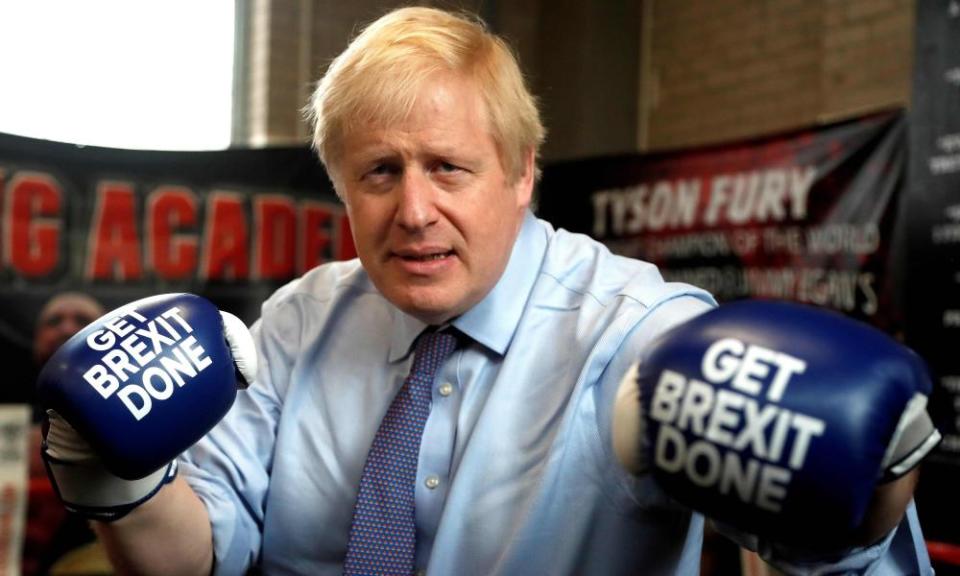Does Boris Johnson stir up team conflict to help make up his mind?

Downing Street’s union unit disintegrated last week into an all-out factional war among those closest to Boris Johnson. For those who have taken a close interest in his management style, there was a whiff of familiarity about the way the psychodrama played out.
Oliver Lewis, a key aide who was appointed to head the No 10 body, quit after just two weeks in the role. His predecessor, Luke Graham, was let go earlier in February, with just weeks to go until the Holyrood elections that some senior Tories fear will result in Nicola Sturgeon’s SNP securing a convincing victory.
From a drip of anonymous briefings, Johnson’s partner, Carrie Symonds, has been assigned the role of Lady Macbeth, blamed for being the scheming power behind a put-upon and befuddled prime minister.
Lewis has been portrayed as Symonds’ latest victim as she ousts those seen as allies of Johnson’s former chief aide Dominic Cummings.
Allegra Stratton, Johnson’s influential new press secretary and a former Guardian journalist, has denied claims this weekend that she has also fallen out with the prime minister’s fiancee. “We are all a nest of singing birds,” she told the Mail on Sunday.
Turn back 13 years to when Johnson was elected mayor of London, and he was similarly portrayed as being hit by a slew of rows and walkouts as aides jostled for position over their jobs.
Those who worked closely with him say Johnson encourages rows and tensions over policies as he considers all sides of the argument and figures out what he will do next.
Some argue that it generates a creative energy in which he thrives and is the process by which he arrives at a final decision. Ask others, and they say he cannot make up his mind until options have been whittled down by time and after those he relies on to walk out in exasperation.
Andrew Gimson, Johnson’s biographer who has maintained close relations with those around him, said there is an intellectual restlessness in Johnson that demands that arguments are thoroughly thrashed out before coming to a conclusion.
“Boris would get very, very bored if he was part of some perfectly constructed machine that is humming along calmly. That would drive him mad. The very thing that many of us aspire to and see as a great achievement with him would to him be a positive failure.
“He does have a problem making decisions because he has to have time to argue against the question. He doesn’t accept the premise that you can either have your cake or eat it. He wants to see if there is a way of doing both,” he said.
Within weeks of taking up his new role, the mayor had been forced to fire his director of strategy, James McGrath, over recorded remarks suggesting that black people could return to the Caribbean if they were unhappy living in a Tory-controlled London. Then one of his deputy mayors, Ray Lewis, was forced to leave over alleged financial improprieties (which he denied) and an embellished CV.
Two weeks later, Tim Parker, a businessman who had been appointed as first deputy mayor in charge of Transport for London and the police, had also departed.
One former colleague said the team around Johnson were often rowing and unable to work together. Many hardly knew each other or the new mayor, or had conflicting views on policy.
“It was a mess. Boris did not offer any leadership and was telling everyone that their views were his priority. And so everyone was at each other’s throats believing they had the boss’s support.”
Guto Harri, the mayor of London’s director of external affairs between 2008 and 2012, said Johnson plucked a disparate group of people including Munira Mirza, his race adviser who has followed him to No 10, with the aim of generating ideas.
“What some see as a chaos is often a reflection of the fact that Boris Johnson tends to assemble teams that are genuinely diverse – in intellectual outlook and preoccupations as well as in background.
“He’s never had a clique like Jeremy Corbyn’s or David Cameron’s Notting Hill set, standing ready to take power. Some of the people who have worked most successfully with Boris barely knew him a few months before joining his team so some tensions and misalignment is inevitable. But it also brings more voices to the mix encouraging a less tribal and broader perspective,” he said.
Further evidence of Johnson’s “creative chaos” emerged from his six-year tenure as editor of the Spectator from 1999 – a period that is usually remembered for the colourful “Sextator” bed-hopping exploits of Johnson and other employees.
He had engaged in an affair with columnist Petronella Wyatt, while married to his second wife, Marina Wheeler – an affair he denied to both the media and his party leader Michael Howard, ending in his sacking as a shadow minister.
Gimson, who was the Spectator’s foreign editor under him, said Johnson could be relied upon to eventually bring out a magazine every week. But on the way there, his idiosyncratic methods sought bright ideas and sparky arguments between his staff, as he chewed over future policies.
“The thing that many remainers thought was thoroughly unscrupulous – writing two articles for and against leaving the EU before deciding his own position – was because Boris really does generally think there are arguments on both sides, whether that is the European issue or any other issue.”
“He does want the ferment and wants to know that they have gone into the arguments. Other people might think that is too risky but it suits him,” he said.

 Yahoo Movies
Yahoo Movies 